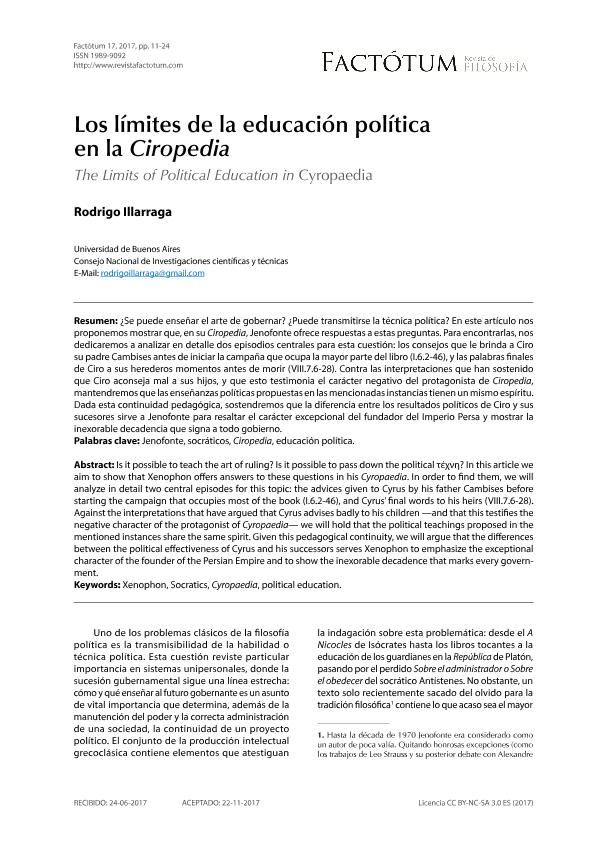Mostrar el registro sencillo del ítem
dc.contributor.author
Illarraga, Rodrigo José

dc.date.available
2019-04-23T19:08:06Z
dc.date.issued
2017-11
dc.identifier.citation
Illarraga, Rodrigo José; Los límites de la educación política en la Ciropedia; Asociación Cultural Factótum; Factótum; 17; 11-2017; 11-24
dc.identifier.issn
1989-9092
dc.identifier.uri
http://hdl.handle.net/11336/74833
dc.description.abstract
¿Se puede enseñar el arte de gobernar? ¿Puede transmitirse la técnica política? En este artículo nos proponemos mostrar que, en su Ciropedia, Jenofonte ofrece respuestas a estas preguntas. Para encontrarlas, nos dedicaremos a analizar en detalle dos episodios centrales para esta cuestión: los consejos que le brinda a Ciro su padre Cambises antes de iniciar la campaña que ocupa la mayor parte del libro (I.6.2-46), y las palabras finales de Ciro a sus herederos momentos antes de morir (VIII.7.6-28). Contra las interpretaciones que han sostenido que Ciro aconseja mal a sus hijos, y que esto testimonia el carácter negativo del protagonista de Ciropedia, mantendremos que las enseñanzas políticas propuestas en las mencionadas instancias tienen un mismo espíritu. Dada esta continuidad pedagógica, sostendremos que la diferencia entre los resultados políticos de Ciro y sus sucesores sirve a Jenofonte para resaltar el carácter excepcional del fundador del Imperio Persa y mostrar la inexorable decadencia que signa a todo gobierno.
dc.description.abstract
Is it possible to teach the art of ruling? Is it possible to pass down the political τέχνη? In this article we aim to show that Xenophon offers answers to these questions in his Cyropaedia. In order to find them, we will analyze in detail two central episodes for this topic: the advices given to Cyrus by his father Cambises before starting the campaign that occupies most of the book (I.6.2-46), and Cyrus’ final words to his heirs (VIII.7.6-28). Against the interpretations that have argued that Cyrus advises badly to his children —and that this testifies the negative character of the protagonist of Cyropaedia— we will hold that the political teachings proposed in the mentioned instances share the same spirit. Given this pedagogical continuity, we will argue that the differences between the political effectiveness of Cyrus and his successors serves Xenophon to emphasize the exceptional character of the founder of the Persian Empire and to show the inexorable decadence that marks every government.
dc.format
application/pdf
dc.language.iso
spa
dc.publisher
Asociación Cultural Factótum
dc.rights
info:eu-repo/semantics/openAccess
dc.rights.uri
https://creativecommons.org/licenses/by-nc-sa/2.5/ar/
dc.subject
Jenofonte
dc.subject
Politica
dc.subject
Educación
dc.subject.classification
Estudios Religiosos

dc.subject.classification
Filosofía, Ética y Religión

dc.subject.classification
HUMANIDADES

dc.title
Los límites de la educación política en la Ciropedia
dc.title
The Limits of Political Education in Cyropaedia
dc.type
info:eu-repo/semantics/article
dc.type
info:ar-repo/semantics/artículo
dc.type
info:eu-repo/semantics/publishedVersion
dc.date.updated
2019-04-23T17:22:11Z
dc.journal.number
17
dc.journal.pagination
11-24
dc.journal.pais
España

dc.journal.ciudad
Salamanca
dc.description.fil
Fil: Illarraga, Rodrigo José. Consejo Nacional de Investigaciones Científicas y Técnicas; Argentina. Universidad de Buenos Aires. Facultad de Filosofía y Letras. Departamento de Filosofía; Argentina
dc.journal.title
Factótum
dc.relation.alternativeid
info:eu-repo/semantics/altIdentifier/url/http://www.revistafactotum.com/revista/f_17/articulos/Factotum_17_2_Illarraga.pdf
Archivos asociados
